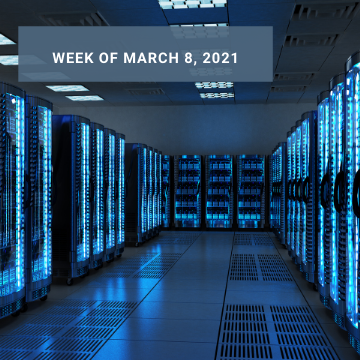Here’s your weekly recap of IT news.
Join our community and find your next job or expert in IT
News story #1: Data centers to curb carbon emissions
One of the main arguments against the expansion of cloud computing could turn out to be one of the strongest reasons for the technology’s wider adoption.
Data centers have long been known to need vast amounts of power to keep their servers cold and operational. Basic logic dictates more data centers will translate into greater electricity consumption, but, as is often the case with global issues, basic logic is not always enough.
For each centralised data center in a cloud network, fewer, discrete computing resources will be needed to sustain the productive ecosystem. And that means energy savings. Additionally, smarter data centers can reduce electricity consumption by optimising power distribution and the cooling of servers.
Well, according to new research by IDC, a combination of these two strategies could save the planet 1B metric tons of carbon emissions by 2024.
News story #2: The Microsoft hack
Problems keep piling up for American cybersecurity experts. And, consequently, for everyone else. On the heels of the SolarWinds hack that left thousands of companies and government bodies open to vulnerability exploits, Microsoft announced on March 2 that suspected Chinese-sponsored attackers had identified 4 zero-day exploits in the company’s Exchange business email solution.
While Microsoft immediately released a patch, other hackers have since been busy at work looking for users who have yet to install the update. But even those who patched the issue might still be at risk, as some hackers are targeting backdoors that were put in place during the original attack and never discovered.
Organisations around the globe experienced issues as a result of the breach, including the European Banking Authority. Given how widely used Miscrosoft Exhange is, we can expect other prominent institutions to come forward in the coming days.
Story #3: The EU wants digital sovereignty
Finally, the European Union unveiled on Tuesday a plan to double its chip manufacturing capacity by 2030.
The so-called Digital Compass plan aims to advance the eurozone’s digital sovereignty by funding a series of technology initiatives that grant the region greater autonomy.
In addition to scaling up the production of semiconductor processors to 20% of the global market, the EU wants 5G access for all houses, the online availability of all key public services, and also to build the union’s first quantum computer.
Although vital to Europe’s geopolitical position in a tech-powered future, the chip-manufacturing part of the plan will prove challenging. Making chips is very expensive, and the European industry will have to pivot from building the machines needed to fabricate chips to making the chips themselves.

Check out more of our interviews from our podcast episodes.
